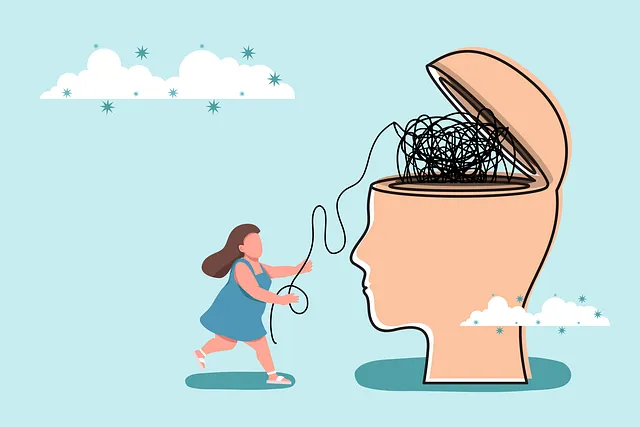Wheat Ridge Kaiser Permanente behavioral health services prioritize mental wellness through specialized coaching, promoting resilience, healthy coping mechanisms, and safe spaces for emotional exploration. This evidence-based approach, tailored to individual needs and culturally competent, enhances productivity, reduces absenteeism, and improves job satisfaction. By integrating best practices, crisis intervention guidance, and continuous improvement strategies, their program contributes to stigma reduction, early intervention, and overall mental health support within healthcare systems.
Mental wellness coaching programs are gaining prominence as essential tools for promoting holistic well-being. This article delves into the development of such programs, highlighting the growing need for specialized mental health support in today’s fast-paced world. We explore designing effective coaching services inspired by the Wheat Ridge Kaiser Permanente behavioral health services model, focusing on implementation strategies and continuous improvement to foster sustainable mental wellness.
- Understanding the Need for Mental Wellness Coaching Programs
- Designing Effective Mental Health Coaching Services
- Integrating Wheat Ridge Kaiser Permanente Behavioral Health Services Model
- Implementation and Continuous Improvement Strategies
Understanding the Need for Mental Wellness Coaching Programs

In today’s fast-paced world, mental wellness has become a paramount concern for individuals and organizations alike. The rise in stress-related issues, burnout, and mental health disorders highlights the pressing need for effective support systems. Programs like Wheat Ridge Kaiser Permanente behavioral health services play a pivotal role in addressing these challenges. By offering specialized coaching, these services aim to empower individuals with tools and techniques for managing their emotional well-being.
Coaching programs focused on mental wellness are essential in fostering resilience and promoting healthy coping mechanisms. They provide a safe space for individuals to explore and understand their thoughts and feelings, enabling them to develop personalized strategies for stress management. This proactive approach not only benefits the individual but also has positive implications for organizations, as it contributes to increased productivity, reduced absenteeism, and improved overall job satisfaction by fostering a culture of emotional well-being through Burnout Prevention and Stress Management Workshops Organization techniques.
Designing Effective Mental Health Coaching Services

Designing effective mental health coaching services requires a multifaceted approach that integrates best practices from behavioral health professionals, such as those provided by Wheat Ridge Kaiser Permanente’s behavioral health services. The first step involves understanding and addressing the unique needs of each individual. This includes assessing their current emotional regulation skills, identifying triggers for distress, and tailoring interventions to support their specific goals. A culturally competent approach is essential, ensuring that coaching aligns with the values, beliefs, and experiences of diverse clients. Healthcare provider cultural competency training equips coaches to offer sensitive and effective guidance, fostering trust and openness in the therapeutic relationship.
Additionally, integrating crisis intervention guidance into the coaching program empowers both the coach and the client to navigate challenging situations proactively. By equipping individuals with coping strategies and problem-solving skills, mental wellness coaching can significantly enhance their ability to manage stress, overcome obstacles, and maintain overall emotional well-being. This holistic approach, guided by evidence-based practices and a deep understanding of cultural nuances, ensures that coaching services are not only effective but also culturally responsive.
Integrating Wheat Ridge Kaiser Permanente Behavioral Health Services Model

The Wheat Ridge Kaiser Permanente Behavioral Health Services Model offers a comprehensive framework for integrating mental wellness coaching into healthcare systems. This model emphasizes a holistic approach, addressing not just symptoms but also the underlying causes of mental health issues. By drawing on evidence-based practices and tailored interventions, it fosters an environment conducive to recovery and well-being. The program’s success lies in its ability to seamlessly integrate coaching services within primary care settings, normalizing conversations about mental health and promoting early intervention.
This model can significantly contribute to Public Awareness Campaigns Development and Mental Illness Stigma Reduction Efforts through education and open dialogue. Effective communication strategies are at the core of this integration, ensuring that patients feel empowered to seek support without fear of judgment. The Wheat Ridge Kaiser Permanente approach serves as a powerful tool for transforming lives by making mental wellness coaching accessible and normalizing its importance in daily healthcare routines.
Implementation and Continuous Improvement Strategies

The successful development and implementation of mental wellness coaching programs, such as those offered by Wheat Ridge Kaiser Permanente behavioral health services, hinge on a combination of strategic planning and continuous improvement. Initially, establishing clear goals and objectives aligned with evidence-based practices is paramount. This includes integrating Cultural Sensitivity in Mental Healthcare Practice to ensure the program meets the diverse needs of all participants. Regular training sessions for coaches and collaborative partnerships with community resources can significantly enhance the quality of services provided.
For sustained growth, implementing a robust feedback mechanism is essential. Regularly gathering input from both clients and coaches allows for identifying areas of improvement in real-time. This iterative process enables the program to adapt effectively to emerging trends and challenges, including better managing Stress Management and conducting thorough Risk Assessments for Mental Health Professionals. By embracing continuous improvement, these coaching programs can optimize their impact on mental wellness outcomes over time.
Mental wellness coaching programs, as exemplified by the Wheat Ridge Kaiser Permanente behavioral health services model, hold immense potential in promoting individual well-being. By integrating evidence-based practices and focusing on personalized support, these programs can effectively address mental health challenges. Continuous improvement strategies and a user-centric design approach ensure their adaptability to diverse needs. As we navigate an increasingly complex world, investing in such initiatives is crucial for fostering resilient and healthy communities.


